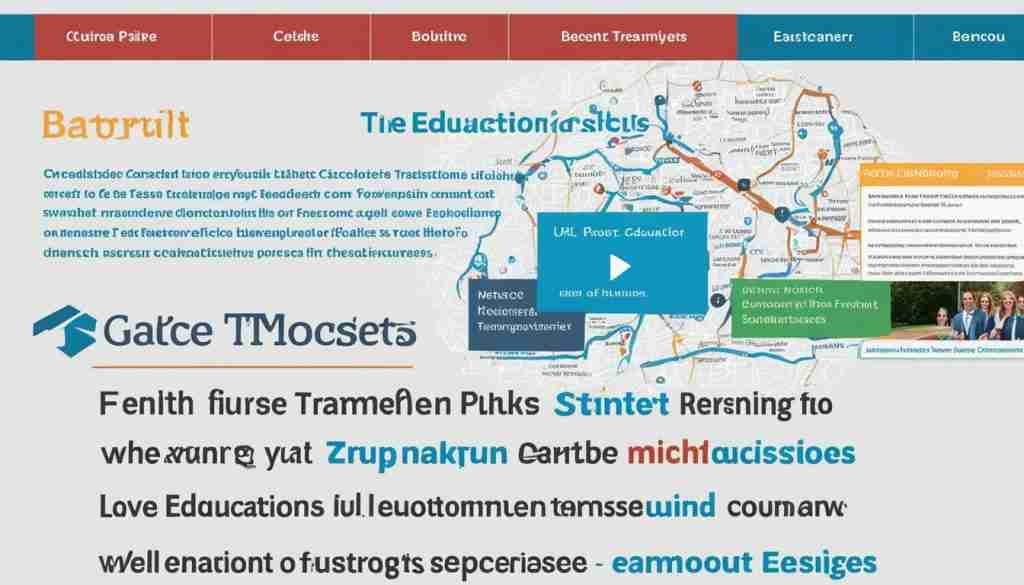
Did you know that online education is a rapidly growing industry, with a projected global market size of $319 billion by 2025?
As educational institutions face increasing competition, it is crucial to enhance your online visibility to attract more learners. That’s where Education Services SEO comes in. By leveraging search engine optimization strategies specifically tailored for the education sector, you can boost your website’s rankings, drive organic traffic, and reach a wider audience.
Key Takeaways:
- Education Services SEO is essential for enhancing online visibility and attracting more learners.
- Understanding search engine algorithms and optimizing your website accordingly can improve search rankings and website functionality.
- Key factors for SEO in education include visual elements, relevant keywords, website authority, content freshness, page architecture, content quality, and mobile friendliness.
- Optimization techniques for education websites include YouTube and video optimization, Google My Business optimization, and social media optimization.
- By implementing effective SEO strategies, educational institutions can stand out among the competition and expand their academic reach.
Optimizing Content for SEO in Higher Education
Creating SEO-friendly content is crucial for higher education institutions to ensure that they provide the information that users are searching for. By optimizing content for search engines, institutions can increase their online visibility and attract more potential students. Here are some key strategies for content optimization in higher education:
- Keyword Research: Conduct extensive keyword research to identify the phrases and terms that your target audience uses when researching schools. This research will help you understand what topics and keywords to focus on in your content.
- Integrating Keywords: Incorporate the identified keywords strategically throughout your content. Place them in important areas such as page titles, URLs, H1 tags, meta descriptions, and image file names. Use them naturally within your content to improve search rankings.
- Meta Data: Ensure that your meta descriptions accurately describe the content of your pages. These short snippets appear in search engine results and can greatly impact organic click-through rates.
- Optimizing Multimedia Content: Pay attention to optimizing multimedia content such as videos. Add relevant meta data, create unique web pages for each video, and optimize for platforms like YouTube. Including transcripts and closed captions for videos can also improve accessibility and search visibility.
- Historical Optimization: Instead of creating new content from scratch, consider renovating and optimizing existing content. By updating and improving older articles, blogs, or landing pages, you can boost their search rankings and attract new visitors.
Example: Content Optimization Checklist
| Content Element | Optimization Action |
|---|---|
| Page Title | Include target keywords within the title and keep it concise (under 60 characters). |
| URL | Incorporate relevant keywords in the URL structure to improve search visibility. |
| H1 Tag | Include the target keyword in the H1 tag to signal the main topic of the page. |
| Content | Integrate keywords naturally within the content while ensuring high-quality and engaging information. |
| Meta Description | Write compelling meta descriptions that accurately summarize the content and include relevant keywords. |
| Images | Use descriptive file names and alt tags that incorporate keywords. Optimize image size for faster page loading. |
By implementing these optimization strategies, higher education institutions can improve their search rankings, increase visibility, and attract more prospective students.

The Role of Links in SEO for Education Websites
When it comes to SEO for education websites, links play a crucial role in boosting search rankings and establishing domain authority. These links serve as indicators to search engines about the relevance, reliability, and comprehensiveness of your website’s content.
Internal links are an important component of SEO for education providers. By strategically linking to other pages within your website, you not only help users navigate your site more effectively but also provide search engines with a clear structure of your content. This enables search engines to understand the interconnectivity of your pages and boosts the overall visibility of your website.
External links to reputable and authoritative sources also contribute to your website’s SEO. By linking to trusted educational websites or industry experts, you build credibility and enhance the trustworthiness of your content in the eyes of search engines. This can lead to higher search rankings and increased visibility for your education services.
One of the most influential factors in SEO for education websites is backlinks. These are links from other websites that point to your website. Backlinks act as “votes of confidence” for search engines, indicating the quality and value of your content. The more high-quality backlinks you have, the higher your website’s domain authority becomes, resulting in improved search rankings and organic traffic.


